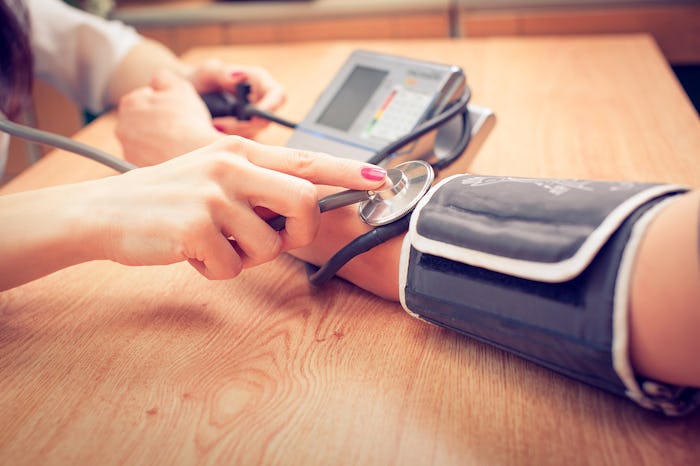Unless you've been told that it's something you need to be aware of, you might not give a whole lot of thought to what your blood pressure is on a regular basis, particularly if you're young, healthy, and aren't pregnant. But some of the things that you do every day or, at least, from time to time, can actually have an impact on your blood pressure that you might not expect. There are a number of things you didn't know are spiking your blood pressure that it might be important for you to be more aware of, particularly if you might actually have higher blood pressure than you thought, because blood pressure issues can have a significant impact on your health — and sometimes you don't experience a ton of obvious symptoms that anything might be amiss.
Mayo Clinic reported that the negative and potentially dangerous effects of high blood pressure (or hypertension, as it's called by your doctor) likely isn't just limited to long-term, chronic high blood pressure. Temporary spikes in blood pressure, like those related to stress, can also have some serious effects. The same article from Mayo Clinic noted that if stressors come close together, your high blood pressure, though temporary, can also potentially hurt your kidneys, heart, and blood vessels. So paying attention to how often you're stressed, as well as other things that can cause your blood pressure to temporarily spike, can actually be pretty important.
Your blood pressure fluctuates throughout the day and depending on different things that you do and a lot of these fluctuations likely aren't hurting you or cause for serious concern. Still, having an idea of how and why those changes happen gives you a better idea of what's going on inside your own body — and that's a good thing.
1Drinking Coffee
If you're a regular coffee drinker who already has borderline high blood pressure and tend to drink a couple of cups each day, you should know that it can have a bit of an effect on your blood pressure, but only for a little while — it's not something that likely causes long-term issues. A 2011 paper published in the American Journal of Clinical Nutrition found that people with high blood pressure experience a spike in blood pressure that lasts about three hours as a result of drinking coffee, but more research is needed.
2Needing To Go To The Bathroom
Dr. Nieca Goldberg, MD, told Reader's Digest that needing to go to the bathroom when your blood pressure is taken can mean a higher reading than if you'd gone to the bathroom first. Having a full bladder can lead to a bit of a spike in blood pressure, but, again, only temporarily.
3Taking A Decongestant
If you have high blood pressure, you might want to avoid taking a cold medicine containing a decongestant when you're sick because as the American Heart Association noted, decongestants — and cold and flu medications that contain them — could potentially raise your blood pressure. If you're worried about how taking cold medications could affect your blood pressure, talk to your doctor or pharmacist.
4Crossing Your Legs
You may or may not realize that crossing your legs has any effect other than affecting the way that you look and feel when you sit, but that's not exactly true. In an interview with Men's Health, Dr. Steve Sheris, MD, said that pumping blood throughout your body to make sure that every part of it gets enough while some pools below where your legs are crossed, can cause your blood pressure to go up a bit.
5Taking A Dip In A Hot Tub
If you have high blood pressure, you definitely need to know that alternating between a cold pool and a hot tub can be a bad idea as well. The American Heart Association noted that switching back and forth between a cooler pool and a hot tub can cause your blood pressure to rise.
6Getting Your Period
A 1991 study published in Clinical Science found that a woman's blood pressure might be higher at the very beginning of her period. It fluctuates over the course of the month, however, lowering later on in the cycle.
7Being Too Cold
You also may not realize that your blood pressure can go up a bit when you're feeling especially cold. Sheris told Men's Heath in the previously-mentioned article that some of your blood vessels constrict when you're cold in an effort to keep your organs warmer, but that that can cause your blood pressure to spike, resulting in a higher reading.
Temporary increases in blood pressure, particularly if your blood pressure's generally normal, might not be cause for much concern (though if it goes super high, that's definitely a different story). But sustained stress and the risk it poses shouldn't be overlooked either. Talking to your doctor about any risks you might have and knowing if there's anything that you should avoid can help you feel like you have a better handle on your health.
